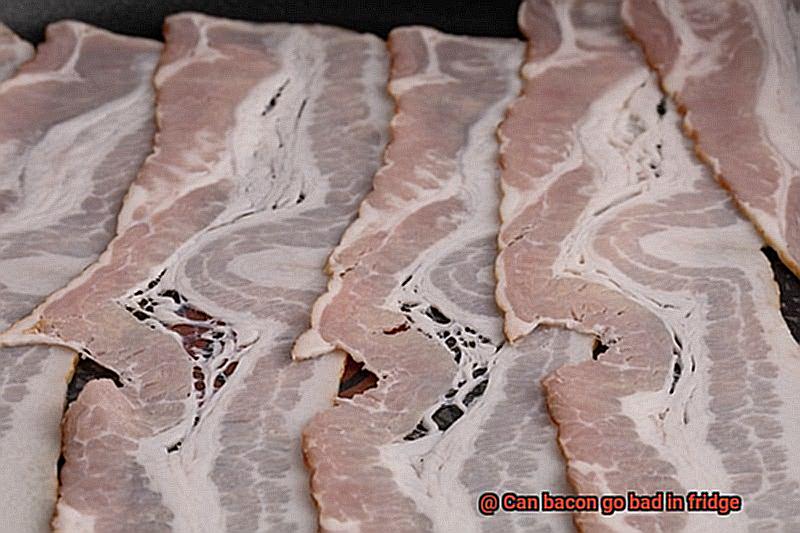Step foot into any kitchen and you’ll be greeted by the loyal accomplice of breakfast lovers, burger enthusiasts, and culinary adventurers alike: bacon. This sizzling sensation, with its tantalizing aroma and mouth-watering taste, has earned its rightful place as a staple in countless households. But what happens when that package of bacon gets forgotten at the back of your fridge? Can bacon actually go bad in the fridge? Today, we embark on a journey to unravel the mysteries of bacon preservation.
Imagine this: life gets hectic, and that once-cherished packet of bacon is left neglected amidst the chaos. Days turn into weeks, and suddenly you find yourself faced with a grim reality: expired bacon. Fear not, fellow bacon aficionados. We’re here to shed light on this subject in our own flavorful way.
Join us on an enticing expedition as we uncover the hidden life of bacon within your refrigerator and reveal just how long it can truly last. We’ll explore the key factors that influence its shelf life – from packaging to temperature and storage techniques – leaving no stone unturned.
But hold on tight because there’s more goodness to come. We’ll also delve into the telltale signs that indicate your beloved bacon has seen better days, along with some ingenious hacks to extend its freshness. After all, who would want to waste even a single strip of that glorious smoky delight?
Prepare yourself for a delectable adventure through the depths of your fridge. Get ready, food enthusiasts, as we set sail on a voyage that will ensure you never have to question the fate of your precious bacon again.
Without further ado, let’s dive deep into the realm of bacon preservation and answer that burning question: can bacon go bad in the fridge?
Contents
How Long Does Bacon Last in the Fridge?
Bacon, the mouthwatering breakfast delight, adds a savory punch to any dish. However, improper storage can quickly turn this beloved treat into a potential health hazard. In this comprehensive guide, we will delve into the factors that influence bacon’s shelf life in the fridge and provide expert advice on storing techniques. Whether you’re a bacon aficionado or an occasional indulger, read on to ensure your bacon remains fresh and safe to consume.
Temperature: The Key to Bacon’s Freshness
Maintaining a temperature below 40°F (4°C) is crucial to prevent bacterial growth and preserve the quality of bacon. To ensure optimal freshness, set your refrigerator temperature accordingly. Avoid leaving bacon at room temperature for extended periods as temperature fluctuations can compromise its shelf life.
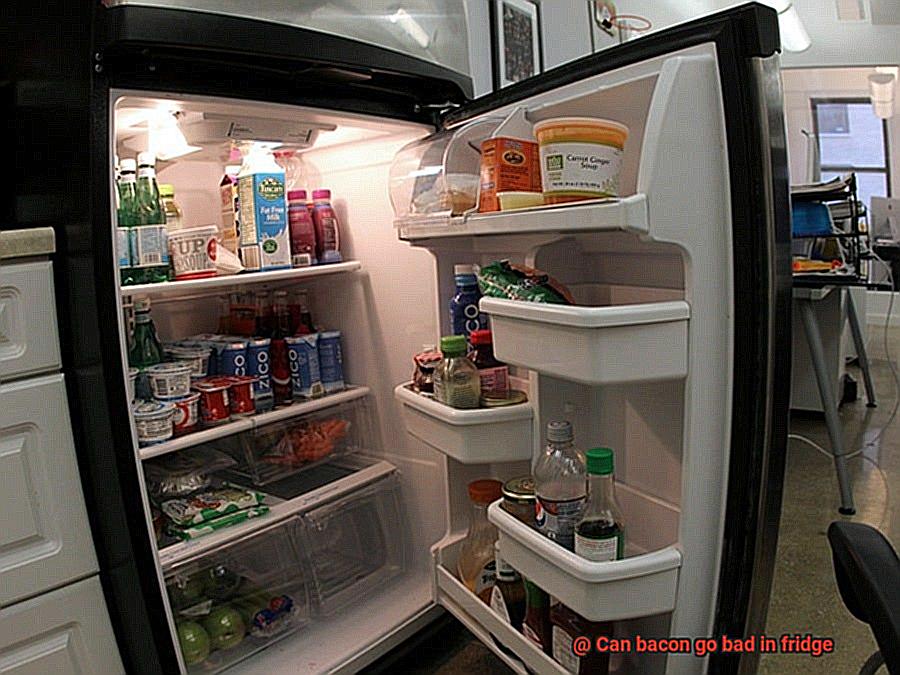
Air Exposure: Minimizing Contact for Maximum Freshness
Limiting air exposure is vital in prolonging bacon’s shelf life. To achieve this, tightly wrap or seal bacon in its original packaging or an airtight container. By minimizing contact with air, you prevent oxidation and preserve the flavor and texture of this delectable treat.
Moisture Control: Keeping Bacon Dry
Moisture acts as a catalyst for spoilage, making it essential to keep bacon dry. Excess moisture can lead to bacterial growth and mold formation. Before storing bacon in the fridge, gently pat it dry with a paper towel if you notice any moisture on the surface or inside its packaging.
Shelf Life: How Long Can Bacon Last?
When refrigerated at a temperature below 40°F (4°C), bacon typically maintains its quality for about 7 to 10 days from the purchase date. Remember to consult the packaging for any specific instructions or expiration dates provided by the manufacturer. By adhering to these guidelines, you ensure both the freshness and safety of your bacon.
Cooked Bacon: Proper Storage Techniques
If you have cooked bacon that you wish to store in the fridge, it can remain fresh for up to 4 to 5 days. Preserve its quality and prevent contamination by storing the cooked bacon in an airtight container or wrapping it tightly with plastic wrap. These methods safeguard its taste and texture while minimizing exposure to air and moisture.
Factors that Affect the Shelf Life of Bacon
The sizzling symphony of flavors that dances on our taste buds. But how can we ensure that our beloved bacon remains fresh and safe to devour for as long as possible? Fear not, for I am an expert in all things bacon, and I’m here to reveal the secrets behind its shelf life. So, put on your bacon-loving hats, because we’re about to embark on a journey into the factors that can make or break your bacon’s longevity.
Temperature: Keeping It Cool, Baby.
When it comes to preserving the shelf life of bacon, temperature is the name of the game. Your bacon buddy should always be refrigerated at temperatures below 40°F (4°C). Why, you ask? Well, those chilly temps slow down the growth of bacteria and other pesky microorganisms. Remember, leaving your bacon out at room temperature for too long is like giving bacteria a VIP pass to spoilage city.
Packaging: A Shield Against Spoilage
Pay close attention to how your bacon is packaged – it’s a game-changer. Most commercially available bacon comes in a vacuum-sealed package or is tightly wrapped in plastic. This packaging acts as a protective shield against air and moisture, the dynamic duo that accelerates spoilage. So, keep your bacon snug in its original packaging until it’s time to unleash its deliciousness, and it’ll maintain its quality for an extended period.
Quality: Choose Wisely, Bacon Lovers.
The quality of your bacon can make or break its shelf life. Opt for freshly cured and high-quality bacon, as it tends to have a longer lifespan compared to its lesser counterparts. Before purchasing or indulging in this porky delight, inspect it for any signs of spoilage like an off smell, discoloration, or a slimy texture. If anything seems amiss, bid farewell and give the bacon a proper send-off.
Cross-Contamination: Keep It Solo
Imagine raw bacon mingling with other food items in your fridge – not a pretty sight, right? Well, it’s not just about aesthetics; it’s also a cross-contamination risk. The bacteria present in raw meat can easily transfer onto other foods, increasing the chances of spoilage. To keep things in check, store your bacon in a separate compartment or container, away from its food neighbors.
Proper Storage Techniques for Bacon
The sizzling, savory delight that has the power to turn any meal into a masterpiece. But what happens when you find yourself with a surplus of this crispy goodness? Fear not, my bacon-loving friends, for I am here to reveal the secrets of proper storage techniques that will keep your beloved strips fresh and safe for longer. So grab your apron and prepare to become a bacon-storage superhero.
Refrigerator Redemption:
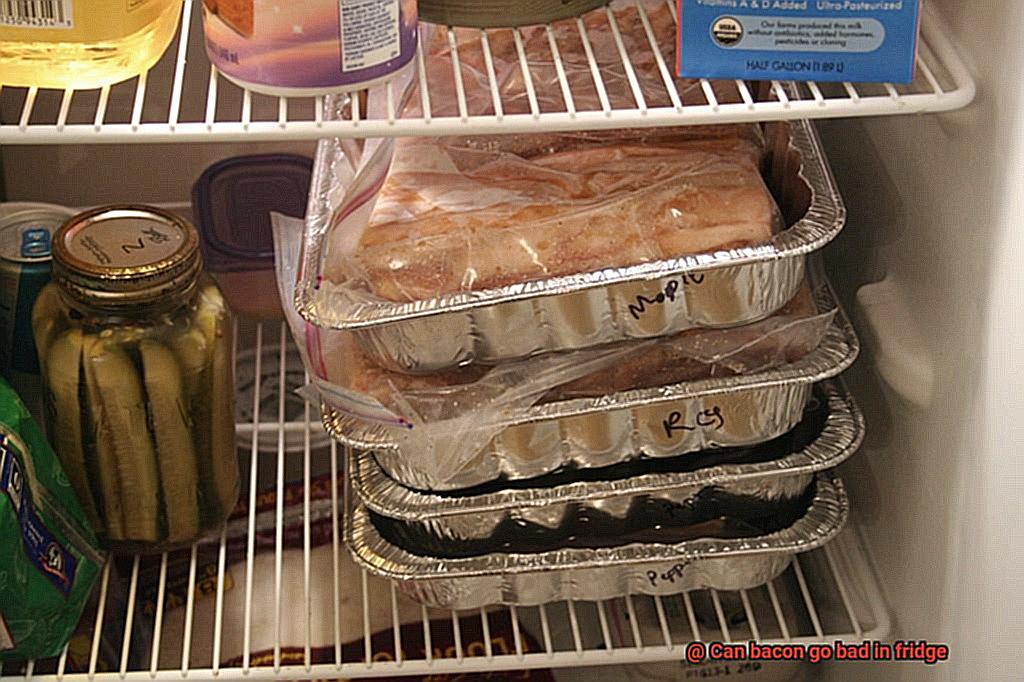
Bacon, the crowned prince of breakfast meats, deserves nothing less than the royal treatment of the refrigerator. Its chilly embrace acts as a fortress against the army of bacteria, ensuring your bacon stays fresh and tantalizingly delicious. Say goodbye to countertop storage and hello to the paradise of cold preservation.
Seal the Deal:
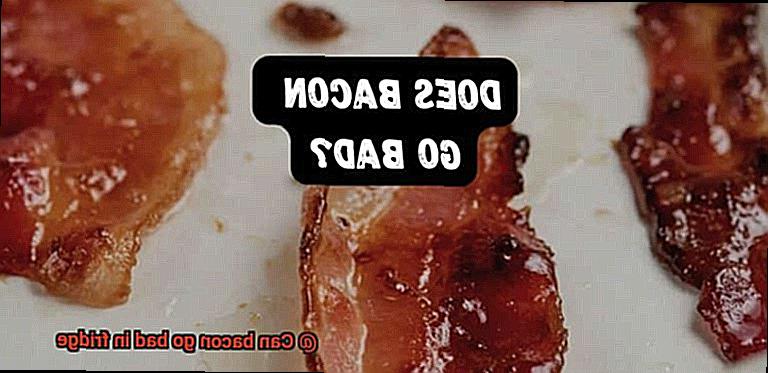
Air and moisture are the sworn enemies of bacon freshness, threatening to spoil its glorious flavors. To shield your bacon from their sinister clutches, transfer any remaining slices to an impenetrable fortress – an airtight container or a resealable plastic bag. This simple act ensures that each slice retains its delectable essence until it meets its ultimate fate in your frying pan.
Location, Location, Bacon:
Your refrigerator is a labyrinth of temperatures, but fear not, for I shall guide you to the promised land of bacon preservation. Seek out the back of the bottom shelf – the coldest sanctuary in this chilly realm. Placing your bacon here guarantees a steady and consistent temperature that will keep it at the peak of freshness for as long as possible.
Use It or Lose It:
Bacon is a fleeting pleasure meant to be savored promptly, its window of perfection open for only 7 to 10 days after opening the package. Trust your instincts – if an unpleasant aroma wafts from its confines, if discoloration taints its once vibrant hues, or if a slimy texture defiles its crispy allure, it is time to bid adieu and discard it safely.
Signs of Spoilage in Bacon
Brace yourselves as we embark on a journey to uncover the secrets of spotting spoilage in our beloved breakfast superstar. With its mouthwatering flavor and irresistible smokiness, bacon is a culinary delight. However, improper storage or neglecting to consume it promptly can lead to decay. Let us arm ourselves with knowledge and become masters at detecting signs of spoilage in our precious strips.
Color Change – A Warning Sign.

Cast your eyes upon fresh bacon, and you’ll be greeted by a delightful pink or reddish hue. But beware the treacherous transformation. If your bacon starts donning a grey or brown cloak, it’s time to sound the alarm. This shift in color serves as an unmistakable signal that your bacon has crossed over to the dark side and must be banished immediately.
The Slimy Situation
Picture this: you reach out for your anticipated slice of bacon, only to be met with a slimy and sticky nightmare. The horror. This repulsive texture is a clear indication of spoilage. Don’t even think about salvaging it; just bid farewell and welcome a fresh pack into your kitchen kingdom.
Sniff Test – Trust Your Nose
In our quest for bacon bliss, our olfactory senses become our most trusted allies. Freshly cooked bacon imparts an aroma that dances with delight. But should your nostrils detect even the faintest hint of sourness or repugnance, it’s time to part ways with that foul-smelling offender. Trust your nose—it possesses the wisdom to guide you on the path of bacon safety.
The Moldy Menace
Beware, dear bacon enthusiasts, for mold growth on your prized strips is an enemy not to be taken lightly. Should your eyes stumble upon any green, fuzzy, or black intruders on the surface, halt your bacon-consuming plans immediately. Mold serves as an unmistakable sign of spoilage, demanding swift action and a prompt disposal of the tainted goods.
Tips to Extend the Shelf Life of Bacon

Bacon, a culinary treasure loved by many, deserves to be stored with care to ensure its freshness and taste. This article dives into the realm of preserving bacon’s quality by providing expert tips on extending its shelf life. By following these guidelines, you can savor the mouthwatering flavor of bacon for an extended period.
Tightly Seal for Longevity:
The first step in preserving bacon is to seal it properly. Whether in its original packaging or transferred to an airtight container, a tight seal is vital. By minimizing exposure to air, you prevent spoilage from occurring prematurely. Remember, a secure seal keeps your bacon deliciously preserved.
Embrace the Coolness:
The temperature at which you store bacon greatly impacts its shelf life. Embrace the coolness of your refrigerator by ensuring the temperature stays below 40°F (4°C). This cool environment inhibits bacterial growth, helping your bacon retain its freshness and taste. Let your bacon luxuriate in a chilly haven.
Keep Odors at Bay:
Bacon possesses a captivating aroma that can easily mingle with other strong-smelling foods in your fridge. To safeguard your bacon’s unique flavor profile, separate it from potent odors like onions or garlic. Designate a special spot for your bacon, ensuring it remains untainted by competing scents.
Freeze with Caution:
Freezing can be a valuable tool for preserving excess bacon, but it’s essential to exercise caution. While freezing extends shelf life, it may slightly alter the texture of the bacon upon thawing. Freeze judiciously by wrapping your bacon tightly in freezer-safe packaging such as aluminum foil or freezer bags, and diligently label it with the date for easy tracking.
Thaw Wisely:
When it’s time to use your frozen bacon, thawing becomes a critical step. Choose the path of wisdom by thawing your bacon safely. Opt for either the refrigerator or defrost function on your microwave, as these methods allow for a slow and controlled thaw. By preserving its quality during the thawing process, you ensure a delightful culinary experience.
Freezing Bacon

Calling all bacon enthusiasts. Prepare to embark on a journey that will revolutionize your bacon game. Did you know that freezing bacon can not only keep it fresh but also enhance its shelf life? Get ready to unleash the power of freezing and discover the secrets to maintaining the utmost quality in every savory slice.
Preparing for Freezing:
Before we dive into the world of frozen bacon paradise, ensure your bacon is still fresh by checking the expiration date. Remember, we’re preserving the good stuff here, so no room for anything less than perfection.
Slice and Seal:
Unlock the full potential of freezing bacon by separating those mouthwatering slices and securing them in airtight freezer bags or containers. This essential step prevents pesky freezer burn and guarantees effortless portioning when your culinary masterpiece calls. Pro tip: label those bags or containers with the date of freezing for easy tracking.
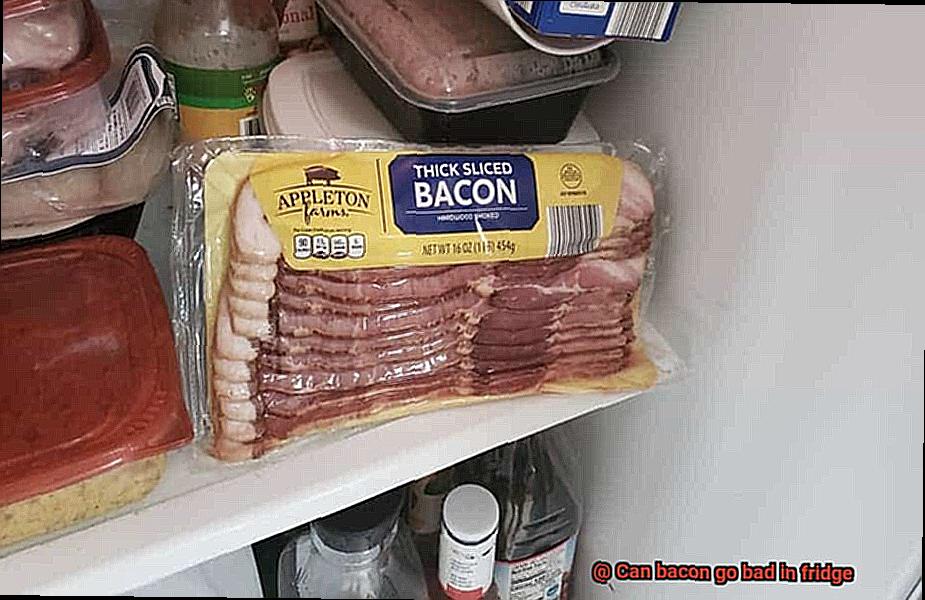
Stay Cool:
To maintain bacon’s frozen glory, keep it at a constant temperature of 0°F (-18°C) or below in your freezer. This ensures that your bacon remains safely frozen, ready to elevate any future cooking escapades. Remember, a cool environment is key to preserving the essence of this sizzling delight.
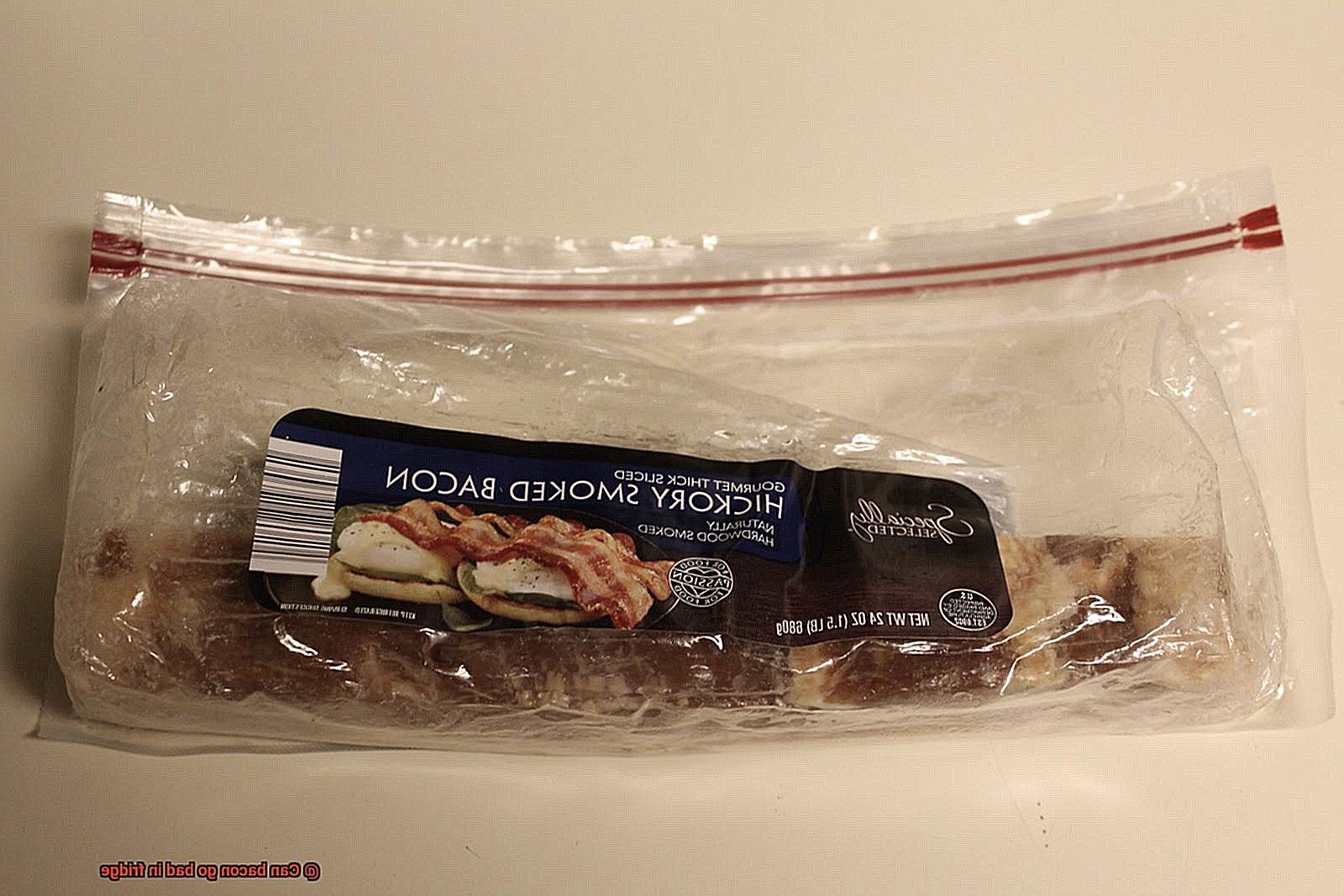
Time is of the Essence:
Frozen bacon has an impressive storage life of up to three months without significant quality loss. However, for an incomparable taste and texture experience, indulge within one month. Trust us; this mouthwatering treat is worth savoring sooner rather than later.
Thaw with Care:
Picture this: you’re ready to enjoy your frozen bacon treasure—now comes the thawing part. Embrace patience and opt for thawing in the refrigerator, allowing for a slow and gentle process that keeps flavors intact and textures divine. Remember, good things come to those who wait.
Eat it Fresh:
Once your bacon has successfully thawed, seize the moment and use it within a few days. Resist the urge to refreeze thawed bacon, as it may compromise its texture and taste. Let each bite be a heavenly experience, bursting with the essence of perfectly preserved bacon goodness.
Thawing Frozen Bacon
Whether you revel in the sizzle of breakfast or crave the mouthwatering aroma that only bacon can provide, mastering the art of thawing frozen bacon is essential for achieving a flawless bacon experience. In this tantalizing guide, we will unravel the secrets to properly thawing your frozen bacon, ensuring it remains safe, flavorful, and ready to elevate your culinary adventures. So buckle up and prepare for a journey into bacon bliss.
Package with Precision:
Before freezing your precious bacon, take a moment to package it with care. Wrap each individual slice or portion tightly in plastic wrap or store it in a freezer-safe bag or container. By doing so, you shield your bacon from the dreaded freezer burn and preserve its unmatched quality until the moment of consumption.
Slow and Steady Wins the Bacon Race:
To achieve bacon nirvana, the best method for thawing frozen bacon is to transfer it from the icy grips of the freezer to the welcoming embrace of your refrigerator. Allow this tantalizing treat to thaw gradually over a leisurely 24-hour period. This unhurried process ensures that your bacon remains at a safe temperature while preserving its delectable flavor and texture.
Time is Bacon’s Greatest Foe:
Bacon, like all good things in life, should be savored promptly. Once thawed, it is essential to use your bacon within a few days to guarantee optimal freshness and safety. However, if an abundance of thawed bacon graces your kitchen, fear not. It can be refrozen safely, albeit with a slight change in quality.
Microwave Magic: A Bacon Emergency Solution:
Should time play tricks on your breakfast plans and you find yourself in dire need of thawed bacon at lightning speed, fear not. Your trusty microwave can come to the rescue. Utilize the defrost setting, following the manufacturer’s instructions diligently. Remember to rotate the bacon frequently to ensure even cooking and prevent unsightly hot spots. The result? Perfectly cooked, irresistibly crispy bacon in record time.
AUMum7-DGEs” >
Conclusion
In conclusion, it is important to note that bacon can indeed go bad in the fridge.
Despite its long shelf life and ability to be preserved, bacon is still susceptible to spoilage if not stored properly. The key is to ensure that the bacon is tightly sealed in an airtight container or wrapped tightly in plastic wrap to prevent exposure to air and moisture.
Remember, while bacon may be a delicious treat, it’s always better to err on the side of caution when it comes to food safety.

